- Home
- Rex Sumner
Mistress of the Gods Page 4
Mistress of the Gods Read online
Page 4
“I say,” said the indignant fop, furious at being ignored. “Who do you think you are, girl? Don’t give advice to your betters, just pass on the message as it was given to you.” One of his friends grabbed his arm, too late, as the princess whipped out a slender rapier which sliced the fop’s cheek before resting on the side of this nose.
“Philip, you always were an ass, what idiot said you could come to war? You don’t understand a thing about it and can’t even hold a sword.” Now the princess gave him her sole attention, twisting the rapier a fraction, sufficient to raise a tiny ruby bead by the point.
“Asmara, get back to your report and stop playing the fool,” said the king with a sharp tongue, diverting her attention.
“Philip, go back to your friends, don’t try and get attention the wrong way,” said Asmara. “Listen to your betters, by which I mean experienced soldiers and nothing to do with birth. Learn from them and learn to rule. It is what I am doing and why I am a better soldier than you can even imagine.”
Colonel Donnell, with no noble pedigree to protect him from Philip and his friends, carefully moved figures into the areas Asmara indicated.
“How many did you lose?” General Roberts interrupted.
“Sir, we, the scouts, are intact but the screen took a beating. More than twenty wounded and five dead.”
The general looked at the floor before turning to the side of the tent. “Five Pathfinders? How?”
The girl shrugged. “One Spakka was just too fast and too good, sir. He actually wounded six people and killed three before we took him down.”
“Thank you, Lieutenant Starr,” said Colonel Donnell. “You are dead on your feet, go and get some rest. Report back tomorrow at 08.00 for new orders.”
“Sir,” said the princess, with a glance to her father. He was fixated on her, his gaze an intense stare and she knew what he wanted. Sadly, she shook her head. “No news,” she said and walked from the tent, hurting to see her father shrink at her words.
Other soldiers came in a steady stream, each with reports on enemy troop movements and strength. General Roberts watched without comment, replying shortly to the occasional comment made to him by other generals. He stiffened when a boy announced himself as from the North Hallows Regiment, one of the most northerly and held in high regard. Unlike their southern cousins, the North Hallows didn’t indulge in fripperies like rank insignia.
“Who are you, sir?”
The boy looked at the general with old eyes. “Major Young, sir.” The king smiled. He wondered if the general knew it was a compliment to receive an answer from the boy, as the whole regiment despised the soft Southrons.
“Compliments to your brother,” said the general, causing a stir amongst the gathered senior officers, who peered with more interest at the boy. “Is the Regiment provisioned?”
“Poorly, sir.”
“We have a breakthrough occurring, an attempt to round us. Do ye know this area?” The general indicated the map, south of where Asmara said the Spakka gathered. The boy nodded.
“Your land, I believe. Well, we have reason to believe the Spakka will launch a distraction strike through here. Where can we stopper the bottle, cork them up with the fewest number of men?”
The boy studied the map for a long minute, before jabbing an empty area. “Cold Mere, sir. Will need another regiment as well, two if they’re Southron.”
The general held up a hand to still the protests of the officers, most of whom were from the south and looked down on the uncouth northerners who couldn’t stop the savages from encroaching and needed assistance. “Area looks wide open. How can you stop them there?”
“One side is the river, on the edge of the mountain. Rough ground. Trail the other side, takes a wagon in places. Far side looks like open ground, fair ground, short grass. It is the Cold Mere, high bog land. Impassable. Spakka cannot get round. But they are tough and will push hard down the main road. How many coming?”
“Highest estimate is two thousand, might be half that.” The boy’s lips thinned.
“When did they start to gather in the high wold?”
“Report just came in of sightings of small parties going through.”
“Sir, it is a three day march up there, and the Cold Mere is close to the high wold. If they get past the Mere, they are into the middle of us. We’ll leave tonight, get our Lights underway in an hour, they should hold them till the rest of us arrive. We’ll hold them till you get us support, sir.” The boy bent to the map, his mouth working in silence. “Reckon we’ll need supplies sent after us, enough for a week. Can I have a Priority Requisition, sir?”
“Colonel Donnell, write it out. The king will sign it now. Major Young, I will have a regiment after you tomorrow and another the day after to back you up.”
The colonel scrawled a note on a piece of paper before handing it to the king. Richard signed it and stood, bringing it to the boy, who stiffened to attention, perhaps avoiding the king’s embrace.
The king hesitated. “Is there no alternative, General?”
“We can’t have them amongst our baggage trains, sire. War would be over.”
“It will be Hilario, sire,” said Major Young. “We wondered why we couldn’t see his standards with the main army. Makes it personal.”
“Go with God, my boy,” said the king, a hand on the major’s shoulder. Major Young stiffened again, accepted the requisition and swivelled in a smart turn before marching out.
Lord Sol, the Duke of Galicia, came over, eyes bright and interested. “What are the Lights, sire? Why so sad?”
The duke was an old friend of the king, having served together in their youth. The duke’s father had gone against custom and sent his son to serve with the Pathfinders in an attempt to overcome a hundred years of enmity to the conqueror of their country. He alone amongst his nobles stood fast with the king.
“Their fast marchers, 140 paces to the minute,” said the king. “The boy will lead them and he will take them past the mere to a worse place where he will stop the Spakka. The lights will die to a man and he knows I send him to his death. The Spakka will cut them to pieces to get through, by which time the rest of the regiment will be in place at the mere. Get their back-up in fast, General.”
*
The tent flap flew open, sending a fine spray of early morning rain into the tent to announce the king’s arrival. Colonel Donnell, bleary-eyed after a scant five hours sleep, bent to the map. Such an early arrival did not bode well. General Roberts eyed the king over a cup of tepid tea. He pushed an empty mug towards Richard, who filled it, before adding a spoonful of honey.
“Patronising bastard,” he said to the general. “Just because I take his daughter to bed, doesn’t mean I’m going to marry her. Stupid, vacuous cow.” He made a face at the tea. “Eurrrgh. What is the horse piss made from? Why can’t you northerners make decent tea?”
The general sighed, wishing there was word on Susan. The wives and daughters of the realm were doing their best to make him forget her. The word of his sudden availability resulted in a flood of them arriving to cheer up the troops.
“It is a blend, sire, including willow bark which will help your head.”
“There’s nothing wrong with my head, blast your eyes. Anyone arrived in the night?”
“No, not yet. Rotherstone sent word of another delay, though.”
“Of course the bastard did. Knows he will be first man in the wall when we fight.”
Once more the tent flap bulged and this time disgorged the princess into the tent, today resplendent in clean uniform and her red hair falling down her back. She nodded to the officers, kissed her father and helped herself to a cup of tea, disdaining the honey. Sipping her tea, she put an arm around the king’s shoulders and tried to sit on his knee. He grunted in alarm, dropping the leg so she slid off.
“No,” he sai
d before she could speak. “You can’t have a troop, nor can you stand in shield wall. We’ve discussed this to death.” The princess pouted. “If you were any bloody good as a princess you would chaperone me from all these blasted women.”
“Ha, you only want protecting from those you have bedded because you don’t want the crying at being discarded, their dreams of becoming queen dashed in the gutter.” She sipped her tea, before her eyes flashed and her tone hardened. “And why are you chasing me to find Susan anyway, when you are bedding anything that moves? You tried to tell me you loved her, but you are after all these girls in an instant? Strange sort of love, if you ask me.”
“I do love Susan. I was planning to marry her,” said the king with dignity.
“So you show your love for her by taking her friend in the garden while she watches? And you think any woman worthy of respect will put up with that?”
“That was a mistake...”
“A mistake that you were caught.” The princess glared at her father. “I am going to call off the dogs. Poor girl doesn’t deserve you. If she left after one indiscretion, what will she do after the constant performance you are putting on now?”
“No! I want her back. Please, don’t do that Asmara, find her for me.”
“Daddy, it is bad enough having that awful girl Emily Hallows pinching my cheeks and offering to help me find a dress, but the stupid bitch woke me up this morning crying because you took her sister to bed last night. And you expect me to believe you would treat Susan right?”
“Princess, if I may interject,” said Colonel Donnell with diffidence but showing remarkable bravery, in General Roberts’ opinion. “I believe your father is actually showing his love for Susan by trying, and failing, to forget her in the arms of other ladies.”
“Don’t be disgusting, Colonel, and you are being obtuse.” Princess Asmara warmed to her theme, dismissed the colonel with a shake of her head and prepared to put her errant father to the sword, when a gust of damp horse sweat foretold the arrival of a rider. The diffidence with which he pushed into the tent together with the exhaustion stamped on his features alerted them to a perhaps desperate message, and all fell silent as he saluted Colonel Donnell before handing over a packet.
“What’re the words?” A message usually accompanied a written message, without which the writing would not make sense. This in case of interception by the enemy.
“It’s a fleet, sir, at least thirty ships, maybe more. Maybe a lot more.” The silence pooling across the tent at this information shattered as the princess spoke.
“Who are you, soldier?”
The question caught the general’s attention, a damn good one, he thought, considering the tough man with his rough clothing.
“Corporal Hussy, miss, of the Cliff company from the Hardenwall Rangers.” A corporal commanded a company of about twenty men, all from one area and often related. Not a usual choice for messenger, as the general appreciated. “Not many of us left, now, miss, and Baron Hardacre asked for me special, he did. Said he knew I could get through, and I did.” The man lifted his chest but with no smile of triumph.
The princess lifted a hand to forestall Colonel Donnell’s attempt to correct Corporal Hussy’s method of addressing royalty. “You did well, corporal,” she said while panic blazed open the man’s eyes as recognition surfaced. “Compare for me this season’s campaign with previous years.”
The question stilled Corporal Hussy, whose eyes unfocused as the considered. “Any idiot can see there’s more than usual, ma’am, but there is more to it. This lot have purpose, more than before. Usually they are just out for a bit of fun, crash a village if they can, maybe a bit of burning, but the main thing is blooding their axes. There’s method in these boys, few times now they ignored us when in the past they’d run at us quick smart. They’re up to something, ma’am, and it seems to me they’ve come to stay, they have.”
“Thank you Corporal Hussy, you have done well and made an eloquent report.” Corporal Hussy beamed at the compliment, though he had no idea what ‘eloquent’ meant, as she turned to Colonel Donnell. “Give the corporal a chit for a decent bed, hot food and supplies. Corporal Hussy, rest today and tonight. Report here an hour after first light for a message to take back to Hardacre.” She nodded while he stiffened and walked out, a hint of a smile on his face. Both the king and the general smiled at the princess’ commandeering of the colonel’s duties.
The smiles departed with the corporal.
“General Roberts, if you are about to lose me my kingdom I shall not be best pleased.”
“The situation is grave, sire. We don’t have a lot of options. Not enough troops. If we meet them man to man they will crush us. They fear our horse, so will not come onto open ground and up here they don’t need to, they can stick to the rough country.”
“How are they re-supplying?” The princess interjected.
“Galleys, Princess,” said Colonel Donnell. “They are sticking close to the shore and we don’t have the ships to stop them. So we cannot disrupt their supplies or starve them out.”
“Damn this for a fool’s game,” said the princess, still angry. “We should root them out of their islands and put a stop to their ship building rather than let them come onto us each year.”
“Asmara, if you continue to swear I shall put a stop to your soldiering,” said the king with the absent expression of one repeating a frequent point. “Your grandfather tried, remember? Still haven’t replaced the ships and the barons rebel at any attempts to raise the money.”
“Short sighted b…” The princess bit off her words and subsided.
Colonel Donnell coughed. “Sir, I believe we shall see them come into the open ground in front of Hardenwall, this time. I have reports on their building horse barriers, and have worked out what they will do.” The general and king nodded at him and he continued.
“They have built barriers which need four men to carry them. When placed on the ground there is an array of sharp stakes pointing up for horses to impale themselves. We have witnessed them deploying the stakes in front of their shield wall as they practise.”
“Much as we did when we took Galicia,” said the king. “Our archers should pick them off.”
“I believe we are supposed to think that, sire, for they have other soldiers, their trustee slaves, with palliasses and shields.”
“Donnell, how are the Guards progressing with their squares? D’you think they’re ready?” General Roberts leaned forward, considering the map.
“Squares?” Asked the king, eyes alight with interest.
“Sir, they are untried in battle, of course, but I feel they are ready. We just don’t have enough.”
“It’s a weapon I can use,” mused the general. “So, sire, am I still your marshal? Do I have the army? In which case you will learn all about squares.”
The king thrummed his fingers on the table, concentrating on his knife, lying by his hand. Both the general and the colonel leant forward imperceptible amounts, giving off a palpable tension. For once the princess shut up, enthralled. General Roberts might be a superb soldier with a record of unbroken success, but his claim to nobility rested on a grandfather ennobled in battle and a wife from the Fearaigh courts, not a noble in the eyes of the arrogant Galicians. Whether the Galician nobles would accept him as Marshal lay open to doubt – the subject not even raised in the betting shops of Praesidium.
King Richard pulled himself to his feet, glared at his professionals and stamped out of the tent, throwing words over his shoulder as he left. “Full council of war here in the tent in half an hour. Make sure everybody attends.”
*
Nobles packed the tent. Asmara occupied a stool set in an unobtrusive alcove behind the table from where she observed proceedings, committing procedures to memory and attempting to predict actions. The Fearaigh contingent clumped together, all sombre
colours, greens and browns, efficient and attentive, not speaking to each other. In total contrast the Galicians paraded every colour, assuming it was bright, and wore expensive plate armour, impressive, ponderous and suicidal against the fast, singing axes of the Spakka. They chattered their excitement, the younger boasting of their prowess on the training grounds. It was nigh on ten years since the Crown called on Galician assistance to repel the Spakka, and to a man they felt turning up and shaking swords at the cowardly Spakka would suffice to send them home.
The Northern Lords dressed in sombre black and brown, leather studded with metal for a balance of protection and ease of movement. In similar garb, the three professional soldiers, Colonel Donnell and General Roberts plus General Constantine of the Guards, mixed with them. Like the Fearaigh nobles, they said not a word. The Harrhein contingent varied from soldierly to religious, with several wearing a red cross on a white shirt over their mail.
The king pushed into the tent and strode to the table, as the Galicians at last stopped talking, the odd bray lingering.
“I shall be brief. This is not a usual council. We face the greatest concentration of Spakka attackers the country has experienced. This summer leaves us stark choices. Either we stop the Spakka and throw them back into the sea, or they will take the Hardenwall, strengthen over the winter and march on Hallowsfield next year, with Sarl the following year. They will bite into us a little more each year. But this year the Spakka have not just come in great numbers. They have come with a plan, and inside that, plans to deal with our tactics and responses. They have plans to deal with our heavy horse and with our archers, and I have to face the fact that the traditional tactics of the Starrs and Harrhein will not work.”
A murmur rose from the audience, a few nobles starting to rise but restraining themselves, expressions of incredulity on the faces of the Galicians while the northern lords nodded in concerned agreement. Fearaigh nobles cleaned their nails and ignored the Galicians, while many of the Harrhein officers appeared undecided in their reaction.

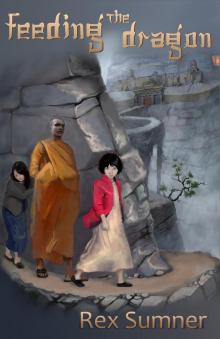 Feeding the Dragon
Feeding the Dragon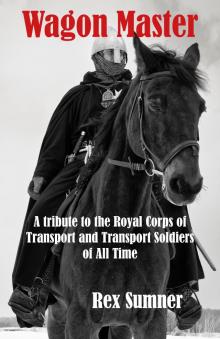 Wagon Master
Wagon Master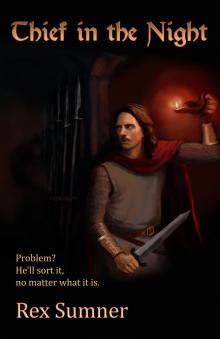 Thief in the Night
Thief in the Night A Tender Embrace
A Tender Embrace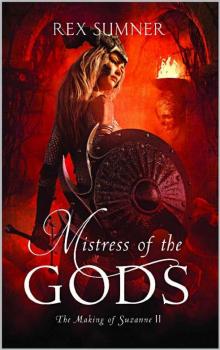 Mistress of the Gods (The Making of Suzanne Book 2)
Mistress of the Gods (The Making of Suzanne Book 2)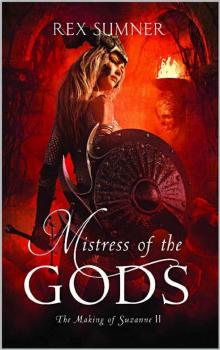 Mistress of the Gods
Mistress of the Gods